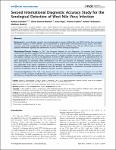Second International Diagnostic Accuracy Study for the Serological Detection of West Nile Virus Infection
Sanchini, Andrea
Mantke, Oliver Donoso
Papa, Anna
Sambri, Vittorio
Teichmann, Anette
Niedrig, Matthias
Background: In recent decades, sporadic cases and outbreaks in humans of West Nile virus (WNV) infection have increased. Serological diagnosis of WNV infection can be performed by enzyme-linked immunosorbent assay (ELISA), immunofluorescence assay (IFA) neutralization test (NT) and by hemagglutination-inhibition assay. The aim of this study is to collect updated information regarding the performance accuracy of WNV serological diagnostics. Methodology/Principal findings: In 2011, the European Network for the Diagnostics of Imported Viral Diseases-Collaborative Laboratory Response Network (ENIVD-CLRN) organized the second external quality assurance (EQA) study for the serological diagnosis of WNV infection. A serum panel of 13 samples (included sera reactive against WNV, plus specificity and negative controls) was sent to 48 laboratories involved in WNV diagnostics. Forty-seven of 48 laboratories from 30 countries participated in the study. Eight laboratories achieved 100% of concurrent and correct results. The main obstacle in other laboratories to achieving similar performances was the cross-reactivity of antibodies amongst heterologous flaviviruses. No differences were observed in performances of in-house and commercial test used by the laboratories. IFA was significantly more specific compared to ELISA in detecting IgG antibodies. The overall analytical sensitivity and specificity of diagnostic tests for IgM detection were 50% and 95%, respectively. In comparison, the overall sensitivity and specificity of diagnostic tests for IgG detection were 86% and 69%, respectively. Conclusions/Significance: This EQA study demonstrates that there is still need to improve serological tests for WNV diagnosis. The low sensitivity of IgM detection suggests that there is a risk of overlooking WNV acute infections, whereas the low specificity for IgG detection demonstrates a high level of cross-reactivity with heterologous flaviviruses.
No license information

